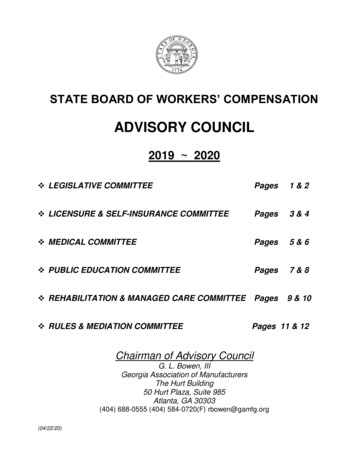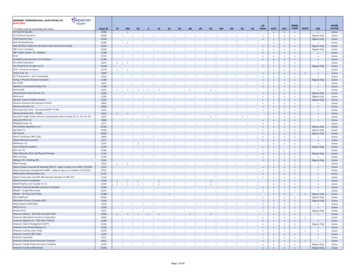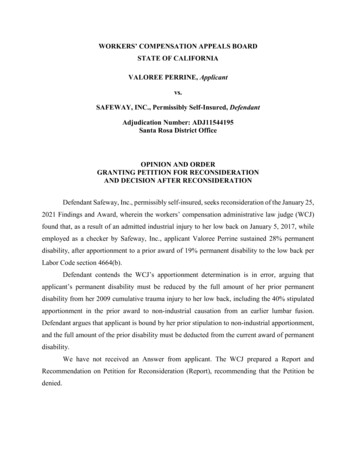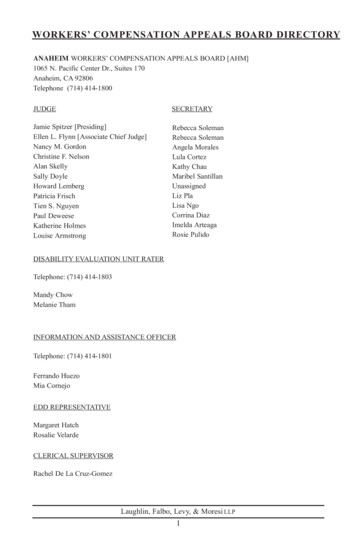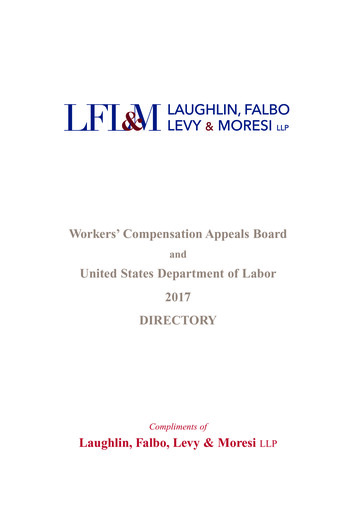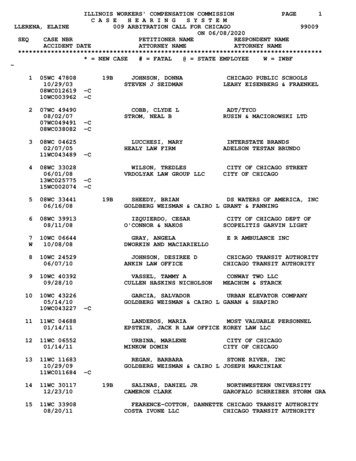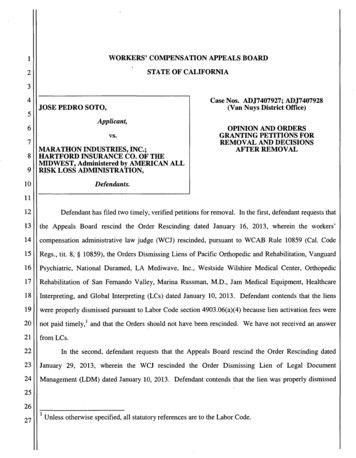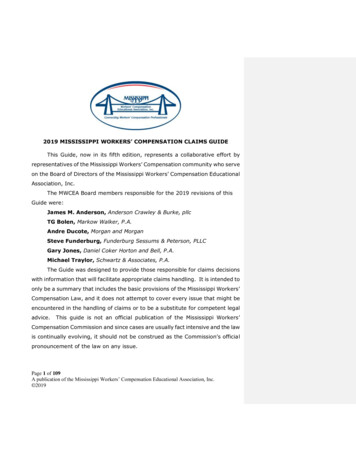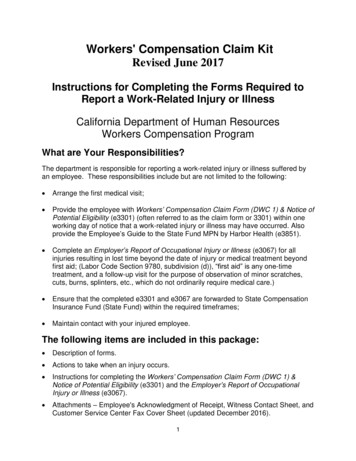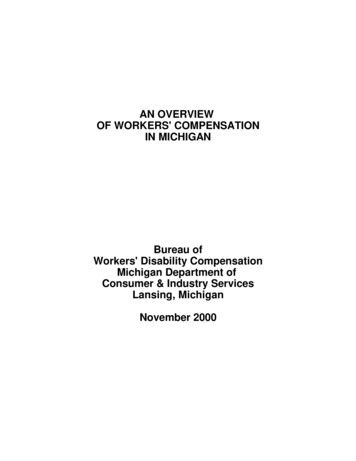
Transcription
AN OVERVIEWOF WORKERS' COMPENSATIONIN MICHIGANBureau ofWorkers' Disability CompensationMichigan Department ofConsumer & Industry ServicesLansing, MichiganNovember 2000
Portions of material in this booklet are based upon Workers'Compensation in Michigan: Law and Practice, a book written byEdward M. Welch and published by the Institute of Continuing LegalEducation, Ann Arbor, Michigan. As the copyright holder of thatpublication, the Institute of Continuing Legal Education has granted itspermission to use the material in this way. The Institute of ContinuingLegal Education is located at 1020 Greene Street, Ann Arbor, Michigan48109-1444, (313) 764-0533.
Table of Contents1.INTRODUCTIONWhat is workers' compensation? . . . . . . . . . . . . . . . . . . . . . . . . . . . . . . . . . . . . . . . . . . 1What is the purpose of this booklet? . . . . . . . . . . . . . . . . . . . . . . . . . . . . . . . . . . . . . . . 1Where did workers' compensation come from? . . . . . . . . . . . . . . . . . . . . . . . . . . . . . . . 2What changes have taken place in the Workers' Disability Compensation Act? . . . . . . 22.COVERAGE UNDER THE ACTWho is covered by the Workers' Disability Compensation Act? . . . . . . . . . . . . . . . . . . . 3Are farms and farm workers covered? . . . . . . . . . . . . . . . . . . . . . . . . . . . . . . . . . . . . . . 3Can a partnership or small business be exempted from the Act? . . . . . . . . . . . . . . . . . 3What if a person is self-employed? . . . . . . . . . . . . . . . . . . . . . . . . . . . . . . . . . . . . . . . . 4Are family members covered? . . . . . . . . . . . . . . . . . . . . . . . . . . . . . . . . . . . . . . . . . . . . 4Are independent contractors exempt from the Workers' Disability Compensation Act? . 4Where can I get more information about coverage under the Act? . . . . . . . . . . . . . . . . 4Is an employer always better off to avoid coverage under the Workers' DisabilityCompensation Act? . . . . . . . . . . . . . . . . . . . . . . . . . . . . . . . . . . . . . . . . . . . . . . 53.INSURANCE AND SELF-INSURANCEMust employers purchase workers' compensation insurance? . . . . . . . . . . . . . . . . . . . 6What is self-insurance? . . . . . . . . . . . . . . . . . . . . . . . . . . . . . . . . . . . . . . . . . . . . . . . . . 6Are there penalties if an employer does not obtain insurance or permission to be selfinsured? . . . . . . . . . . . . . . . . . . . . . . . . . . . . . . . . . . . . . . . . . . . . . . . . . . . . . . . 6Are workers protected if an employer or an insurance company goes bankrupt? . . . . . 7How is the price of workers' compensation insurance set? . . . . . . . . . . . . . . . . . . . . . . 7Where can I get information about insurance? . . . . . . . . . . . . . . . . . . . . . . . . . . . . . . . 74.COVERAGEWhen and where are workers covered? . . . . . . . . . . . . . . . . . . . . . . . . . . . . . . . . . . . . 8Is a worker covered when he or she is traveling? . . . . . . . . . . . . . . . . . . . . . . . . . . . . . 8Is everything that happens at work covered? . . . . . . . . . . . . . . . . . . . . . . . . . . . . . . . . . 8What about recreational and social activities? . . . . . . . . . . . . . . . . . . . . . . . . . . . . . . . . 85.CIVIL LAWSUITSCan a worker sue for damages other than workers' compensation? . . . . . . . . . . . . . . . 9When can a worker sue his or her own employer? . . . . . . . . . . . . . . . . . . . . . . . . . . . . 9Can a worker sue someone other than his or her employer if the other party is at fault?106.DISABILITYWho is entitled to receive disability benefits? . . . . . . . . . . . . . . . . . . . . . . . . . . . . . . .Should a worker who has not completely recovered try to return to work? . . . . . . . . .Must an injured worker accept the offer of a job? . . . . . . . . . . . . . . . . . . . . . . . . . . . .What if the job pays less? . . . . . . . . . . . . . . . . . . . . . . . . . . . . . . . . . . . . . . . . . . . . . .What if the worker does not think he or she can do the job that is offered? . . . . . . . . .Does the job have to be the same as the one the worker was previously doing? . . . .Must an employer offer a job to a worker? . . . . . . . . . . . . . . . . . . . . . . . . . . . . . . . . . .What happens if the worker returns but cannot continue? . . . . . . . . . . . . . . . . . . . . . .Must the work cause the injury? . . . . . . . . . . . . . . . . . . . . . . . . . . . . . . . . . . . . . . . . .What if the work is only one of the causes of an injury? . . . . . . . . . . . . . . . . . . . . . . .Are gradual injuries and occupational diseases covered? . . . . . . . . . . . . . . . . . . . . . .1111111212121213141414
7.DEATH BENEFITSAre death claims treated the same as disability claims? . . . . . . . . . . . . . . . . . . . . . . .Who are considered "dependents" of the deceased worker? . . . . . . . . . . . . . . . . . . .What is the rate of death benefits? . . . . . . . . . . . . . . . . . . . . . . . . . . . . . . . . . . . . . . .How long are death benefits paid? . . . . . . . . . . . . . . . . . . . . . . . . . . . . . . . . . . . . . . .161616168.SPECIAL BENEFITSWhat are "specific loss" benefits? . . . . . . . . . . . . . . . . . . . . . . . . . . . . . . . . . . . . . . . . 17What is "total and permanent disability"? . . . . . . . . . . . . . . . . . . . . . . . . . . . . . . . . . . . 17Which workers can benefit if they qualify as totally and permanently disabled? . . . . . . . . 17Who is considered totally and permanently disabled? . . . . . . . . . . . . . . . . . . . . . . . . . 18How much does a totally and permanently disabled worker receive? . . . . . . . . . . . . . 19What are "second injury" cases? . . . . . . . . . . . . . . . . . . . . . . . . . . . . . . . . . . . . . . . . . 19Is there any special incentive under the Workers' Disability Compensation Act to hirehandicapped workers? . . . . . . . . . . . . . . . . . . . . . . . . . . . . . . . . . . . . . . . . . . . 20Is there any special help for a young worker with high earnings potential who is injured ata low-paying job? . . . . . . . . . . . . . . . . . . . . . . . . . . . . . . . . . . . . . . . . . . . . . . . 20Are there special provisions for police officers and fire fighters? . . . . . . . . . . . . . . . . . 219.WAGE-LOSS BENEFITSWhat benefits can a worker receive? . . . . . . . . . . . . . . . . . . . . . . . . . . . . . . . . . . . . . .How are wage-loss benefits calculated? . . . . . . . . . . . . . . . . . . . . . . . . . . . . . . . . . . .How is a person's average weekly wage determined? . . . . . . . . . . . . . . . . . . . . . . . . .Are fringe benefits included? . . . . . . . . . . . . . . . . . . . . . . . . . . . . . . . . . . . . . . . . . . . .How do you determine 80 percent of the after-tax value of a given wage? . . . . . . . . .Are there maximums and minimums? . . . . . . . . . . . . . . . . . . . . . . . . . . . . . . . . . . . . .Must a worker pay income tax on workers' compensation benefits? . . . . . . . . . . . . . .When and for how long are benefits paid? . . . . . . . . . . . . . . . . . . . . . . . . . . . . . . . . .Are any adjustments made in the rate of benefits? . . . . . . . . . . . . . . . . . . . . . . . . . . .Is there a penalty for the illegal employment of minors? . . . . . . . . . . . . . . . . . . . . . . .Are workers' compensation benefits affected by other benefits a worker receives? . .What if a worker is employed on more than one job? . . . . . . . . . . . . . . . . . . . . . . . . .What is an "advance lump sum"? . . . . . . . . . . . . . . . . . . . . . . . . . . . . . . . . . . . . . . . .22222223232324242425252526MEDICAL BENEFITSWhat medical benefits is a worker entitled to receive? . . . . . . . . . . . . . . . . . . . . . . . .How is the doctor chosen? . . . . . . . . . . . . . . . . . . . . . . . . . . . . . . . . . . . . . . . . . . . . .Can a worker refuse medical treatment? . . . . . . . . . . . . . . . . . . . . . . . . . . . . . . . . . . .How are medical bills handled? . . . . . . . . . . . . . . . . . . . . . . . . . . . . . . . . . . . . . . . . . .27272727VOCATIONAL REHABILITATION BENEFITSWhat rights does a worker have to vocational rehabilitation? . . . . . . . . . . . . . . . . . . .Must a worker take part in vocational rehabilitation? . . . . . . . . . . . . . . . . . . . . . . . . . .Are vocational rehabilitation benefits offered automatically? . . . . . . . . . . . . . . . . . . . .Is vocational rehabilitation important? . . . . . . . . . . . . . . . . . . . . . . . . . . . . . . . . . . . . .2828282810.11.12.PROCEDURESAre workers' compensation claims usually disputed? . . . . . . . . . . . . . . . . . . . . . . . . . 30What happens in the ordinary case? . . . . . . . . . . . . . . . . . . . . . . . . . . . . . . . . . . . . . . 30In what way is a worker required to give notice of an injury or make a claim for benefits?31What other time limitations apply? . . . . . . . . . . . . . . . . . . . . . . . . . . . . . . . . . . . . . . . . 32What reports is an employer required to file concerning workers' compensation? . . . . 32Can a worker or employer get help with these procedures? . . . . . . . . . . . . . . . . . . . . 33How are formal dispute procedures started? . . . . . . . . . . . . . . . . . . . . . . . . . . . . . . . . 33What is mediation? . . . . . . . . . . . . . . . . . . . . . . . . . . . . . . . . . . . . . . . . . . . . . . . . . . . 33
What is a pretrial? . . . . . . . . . . . . . . . . . . . . . . . . . . . . . . . . . . . . . . . . . . . . . . . . . . . .In what way are "small claims" treated differently? . . . . . . . . . . . . . . . . . . . . . . . . . . .How are trials conducted in workers' compensation cases? . . . . . . . . . . . . . . . . . . . .What right do the parties have to appeal the decision of a magistrate? . . . . . . . . . . . .Does the worker receive any benefits during an appeal? . . . . . . . . . . . . . . . . . . . . . .What is arbitration? . . . . . . . . . . . . . . . . . . . . . . . . . . . . . . . . . . . . . . . . . . . . . . . . . . .Is interest payable on workers' compensation? . . . . . . . . . . . . . . . . . . . . . . . . . . . . . .Is there any penalty if an employer does not pay the benefits it owes? . . . . . . . . . . . .What if the employer simply refuses to make payments that are ordered? . . . . . . . . .When can a worker get a "settlement" of his or her workers' compensation claim? . .How are attorney fees calculated? . . . . . . . . . . . . . . . . . . . . . . . . . . . . . . . . . . . . . . . .Are the records of these state agencies open to the public? . . . . . . . . . . . . . . . . . . . .13.343434353637373737383940ORGANIZATIONS INVOLVED IN WORKERS' COMPENSATIONWho is responsible for paying workers' compensation? . . . . . . . . . . . . . . . . . . . . . . . 41What state agencies are responsible for workers' compensation?. . . . . . . . . . . . . . . . . . . . . . . . . . . . . . . . . . . . . . . . . . . . . . . . . . . . . . . . . . . . 41Are there any other federal or state laws which provide protections toinjured workers? . . . . . . . . . . . . . . . . . . . . . . . . . . . . . . . . . . . . . . . . . . . . . . 42Where can additional information be obtained about the Americans With DisabilitiesAct of 1990 (ADA) and the Family and Medical Leave Act (FMLA ) describedin the previous question? . . . . . . . . . . . . . . . . . . . . . . . . . . . . . . . . . . . . . . . . . 43Appendix 1Table 1, Specific Loss ScheduleAppendix 1Table 2, Average Weekly Wage RatesOffices to obtain information and/or ask questions regarding workers' compensation
An Overview of Workers' Compensation in Michigan1.INTRODUCTIONWhat is workers' compensation?Workers' compensation is the system we use to provide wage replacement, medical, andrehabilitation benefits to men and women who are injured while at work.What is the purpose of this booklet?This booklet provides a general outline of workers' compensation law in Michigan. It is notintended to be a legal document and it is not intended to cover every possible situation. Wehope, however, that this will provide general guidelines for the majority of problems thatarise. In other situations, workers, employers, and insurance companies will need toconsult with their attorneys for more specific advice.Much of this book deals with situations that have resulted (or are likely to result) in disputesand litigation. It should be pointed out, however, that most work-related injuries areresolved without dispute and without the need for litigation. In most cases a worker whois injured receives medical treatment and is paid workers' compensation benefits voluntarilyby the employer or its insurance carrier. In time the worker is "rehabilitated" by returningto his or her former job or another one with the same employer. The problem cases—thedisputes—are the few that demand the attention of those who manage the workers'compensation system. Only those unusual cases find their way into administrative tribunalsand courts and finally result in the interpretations of the law that are discussed here.Accordingly, while this book will try to define the limits of workers' compensation bydescribing the extreme cases, the reader is reminded that most cases do not involveextreme or unusual circumstances.It should also be remembered that the law is often changed by the Legislature and isconstantly being interpreted by the courts. Furthermore, there are always new questionsabout workers' compensation that come up. There are many areas in which the courtshave not yet given us a clear interpretation of what the law means. As you read this youwill find many instances in which we cannot answer all of the questions that arise. Thisbooklet, however, will do the best it can to provide general guidance.1
Where did workers' compensation come from?Before 1912, a worker who was injured in the course of his or her employment could suehis or her employer in a civil or "tort" action, which was the same remedy available to aperson injured under other circumstances. The tort remedy, however, had certainproblems. It required the worker to prove that the injury occurred because the employerwas negligent and the employer had three important defenses: (1) that the worker was alsonegligent, (2) that the worker knew of the dangers involved and "assumed the risk," or (3)that the injury occurred because of the negligence of a "fellow employee." Under thissystem it was very difficult for workers to recover against their employers. If they did win,however, they could receive virtually whatever damages a jury wanted to give them.In 1912 Michigan, along with most of the other states, adopted a Workmen's CompensationAct. The new remedy is essentially a "no-fault" system under which a worker no longer hasto prove negligence on the part of the employer, and the employer's three defenses wereeliminated. The intent of the law was to require an employer to compensate a worker forany injury suffered on the job, regardless of the existence of any fault or whose it might be.In return for this almost automatic liability, the Act limited the amount that a worker couldrecover. Workers are now entitled only to (1) certain wage loss benefits, (2) the cost ofmedical treatment, and (3) certain rehabilitation services. Under the old system, workershad been able to recover for pain and suffering, loss of enjoyment of life, and otherdamages that a jury might award. Recovery under worker's compensation is limited tothese three areas, no matter how serious the injury.What changes have taken place in the Workers' Disability Compensation Act?Over the years there have been many changes in Michigan's workers' compensation laws.The most important recent changes occurred in 1965, 1982, 1985, and 1987. This booklettalks about the law in effect on May 15, 1987. In some circumstances it will make referenceto prior law. You should understand, however, that the law may be somewhat different forcases involving injuries before May 15, 1987.2
2.COVERAGE UNDER THE ACTWho is covered by the Workers' Disability Compensation Act?Nearly all employers in Michigan are covered by workers' compensation. This includes bothpublic and private employers. In fact, when talking about workers' compensation, it iseasier to discuss the exceptions. There are a few classes of workers who are covered byfederal laws and are not covered by the Workers' Disability Compensation Act of Michigan.Employees of the federal government (such as postal workers, employees at a veteransadministration hospital, or members of the armed forces) are covered by federal laws.People who work on interstate railroads are covered by the Federal Employers Liability Act.Seamen on navigable waters are covered by the Merchant Marine Act of 1920, and peopleloading and unloading vessels are covered by the Longshoremen's and Harbor Workers'Compensation Act. Virtually all other workers and employers are subject to Michigan's law.Certain very small employers are exempt. If a private employer has three or moreemployees at any one time, or employs one or more workers for 35 or more hours per weekfor 13 or more weeks, the employer is subject to the Workers' Disability Compensation Act.(Section 115)Are farms and farm workers covered?Agricultural employees are exempt under certain special circumstances. An agriculturalemployer, however, may voluntarily cover its workers.Can a partnership or small business be exempted from the Act?The employees of partnerships and corporations are covered. However, Section 161 ofthe Act provides that under certain circumstances named partners and officers who are alsoshareholders of small, closely-held corporations may exempt themselves from the Act.Firms which wish to exclude partners or officers of a corporation but have other employeescan do this by making arrangements with their insurance company. Firms in which all ofthe employees are either partners or owners of a small corporation may obtain a certificateof their exemption under the Act by contacting the Insurance Division of the bureau. Itsphone number and address is found in the back of this booklet.3
What if a person is self-employed?A business that is neither a partnership nor a corporation but is owned by one person iscalled a "sole proprietorship." The owner of that business is "self-employed." Theemployees of a sole proprietorship are covered by the Workers' DisabilityCompensation Act, but the sole proprietor (the person who owns the business) is"self-employed." He or she is not an employee of anyone and accordingly is notcovered by the Act.Are family members covered?Section 161(2) of the Act provides that certain family members of an employer may beexcluded from the Act.Are independent contractors exempt from the Workers' Disability Compensation Act?If one company hires another company to come in and do some work for it, the secondcompany is ordinarily an "independent contractor" and not an employee of the firstcompany. Sometimes, however, a company hires one person to come in and perform aspecific job and disputes arise as to whether or not that person is an employee or anindependent contractor. Section 161(1)(b) of the Act states that if the worker does notmaintain a separate business, does not hold himself or herself out to and render service tothe public, and does not employ other workers, the worker will be considered an employee.Where can I get more information about coverage under the Act?Questions often arise concerning the interpretation of the coverage and exclusionrequirements of the law. Information and assistance concerning these issues is availablefrom the Insurance Division of the Bureau of Workers' Disability Compensation. Thatnumber is listed in the back of this booklet.The Insurance Division has a booklet which provides more information about employers,employees, and independent cont
Recovery under worker's compensation is limited to these three areas, no matter how serious the injury. What changes have taken place in the Workers' Disability Compensation Act? Over the years there have been many changes in Michiga
